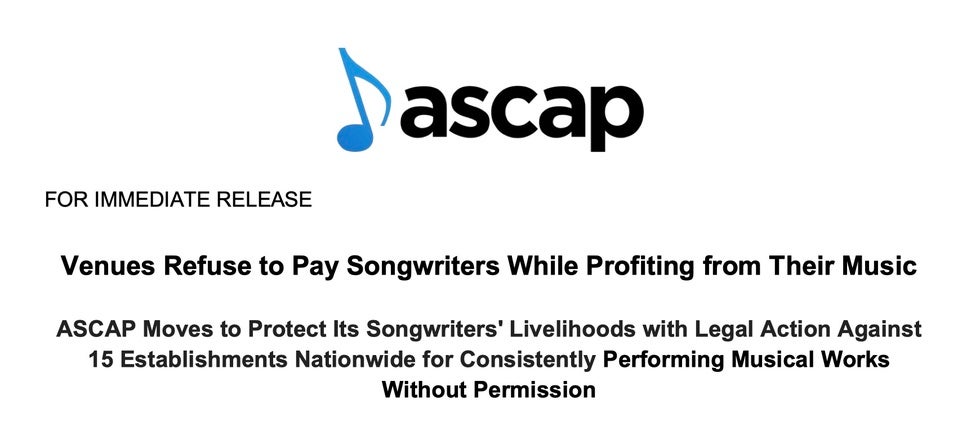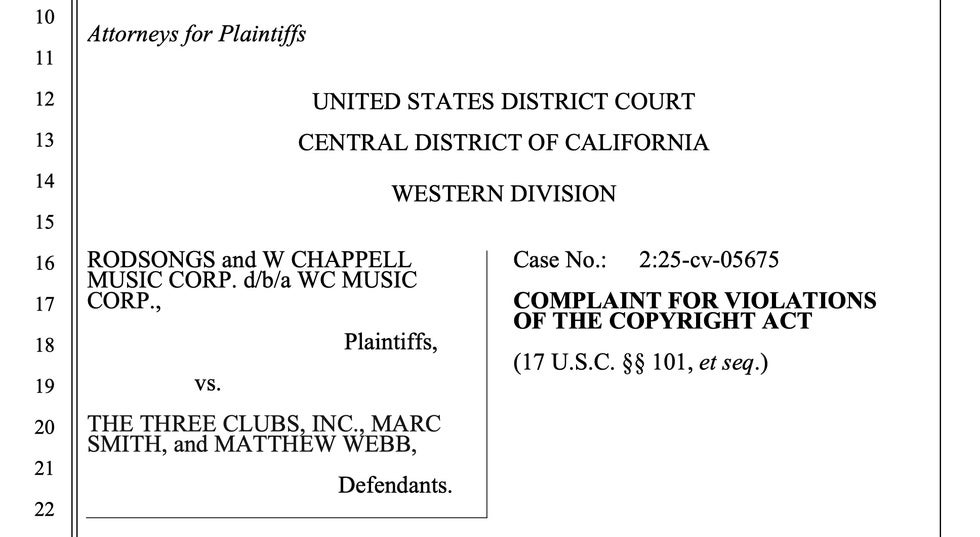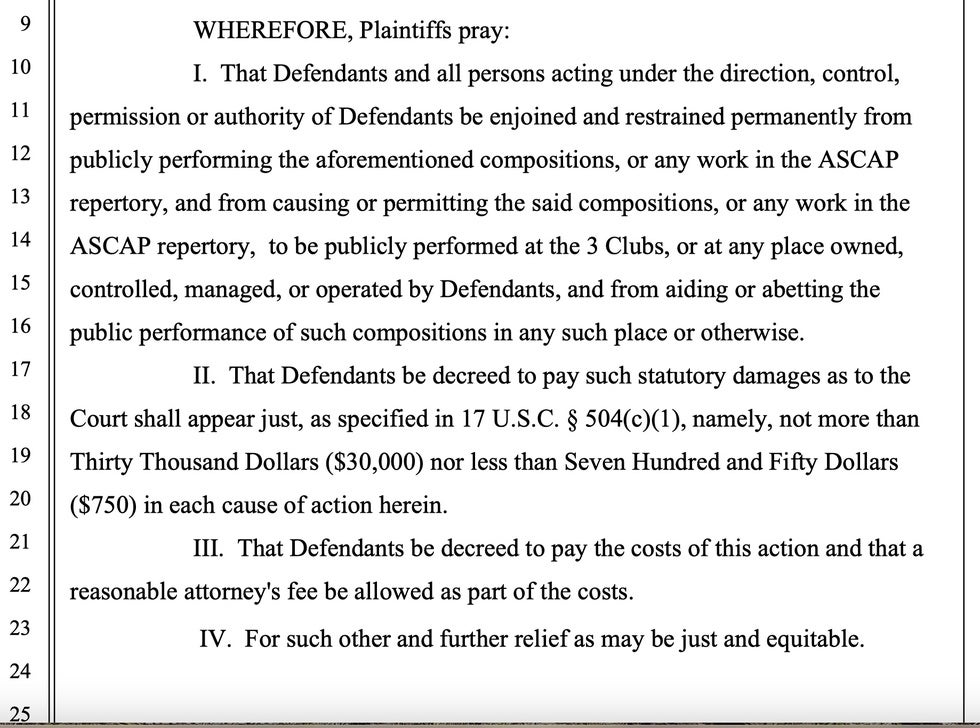Introduction
We have talked about this in other blogs; ASCAP is getting aggressive in enforcing their legal rights when restaurants, bars, fitness centers and other establishments play copyrighted music without having the proper BMI, ASCAP or other licensing rights. The liability falls on the business owner, who could easily avoid legal issues (in this case being hauled into a federal court lawsuit) by simply signing up and paying for music licensing rights.
Who is ASCAP?
According to their LinkedIn page:
"The American Society of Composers, Authors and Publishers (ASCAP) is a professional membership organization of songwriters, composers and music publishers of every kind of music. ASCAP's mission is to license and promote the music of its members and foreign affiliates, obtain fair compensation for the public performance of their works and to distribute the royalties that it collects based upon those performances. ASCAP members write the world's best-loved music and ASCAP has pioneered the efficient licensing of that music to hundreds of thousands of enterprises who use it to add value to their business - from bars, restaurants and retail, to radio, TV and cable, to Internet, mobile services and more. The ASCAP license offers an efficient solution for businesses to legally perform ASCAP music while respecting the right of songwriters and composers to be paid fairly. With over 925,000 members representing more than 11.5 million copyrighted works, ASCAP is the worldwide leader in performance royalties, service and advocacy for songwriters and composers, and the only American performing rights organization (PRO) owned and governed by its writer and publisher members."
You can find out what songs are in their "repertory" by using their "Songview search tool." If your business is publicly performing any of the songs in their database, a licensing fee is needed to avoid allegations of copyright infringement.
Are they publicly shaming infringers?

Here are a few snippets from an announcement I just received that took me a bit by surprise, naming alleged infringers they just filed lawsuits against:
- NEW YORK, June 24, 2025 -- The American Society of Composers, Authors and Publishers (ASCAP) announced today that it has filed 15 separate copyright infringement actions against establishments across the country that are allowing unauthorized public performances of its members' copyrighted musical works.
- ASCAP is a membership association that represents more than one million songwriters, composers and music publishers. ASCAP ensures its members can earn a living from their art by licensing the public performances of their songs, collecting those license fees, and distributing royalties to its members. About 90% of the license fees that ASCAP collects go directly to the songwriters, composers and music publishers as royalties.
- ASCAP has made numerous attempts at the establishments listed below to offer a license and educate the business owners about their obligations under federal copyright law. Despite these efforts, the owners of these establishments have repeatedly refused to take or honor a license. Instead, they have continued to perform the copyrighted musical works of ASCAP's songwriter, composer and music publisher members for the entertainment of their patrons without obtaining permission to do so.
Establishments at issue—lawsuits being filed nationwide!
Here are the companies listed on their announcement.
- Appleton Beer Factory (Appleton, WI)
- Athletica Health & Fitness (Naples, FL)
- Back Then Bar and Grill (Cary, NC
- Belfrey Brewery (Cottonwood, AZ)
- F6ix (San Diego, CA)
- FitzGerald's (Berwyn, IL)
- Genesis Health Clubs (Orlando, FL)
- Lonerider Brewing Company (Wake Forest, NC)
- Lucia (Lawrence, KS)
- O2 Fitness (Morrisville, NC)
- Pono Ranch (Seattle, WA)
- R Bar (South Bend, Indiana)
- The Three Clubs (Los Angeles, CA)
- WeHa Brewing & Roasting Company (West Hartford, CT)
- Wicked Wolf Atlanta (Atlanta, GA)
Remember, proving these allegations in a court of law is required to prevail. Otherwise, all parties are deemed innocent.
Sample Allegations in a complaint
Here is one case filed in the Central District of California.

Here are some allegations pulled from one of the California lawsuits:
-In undertaking the conduct complained of in this action, Defendants knowingly and intentionally violated Plaintiffs' rights. Defendants' knowledge and intent are established by at least the following facts.
(a) Defendants entered into a license agreement with ASCAP, effective April 1, 2010.
(b) Defendants failed to pay the license fees required by the license agreement.
(c) Because of Defendants' failure to pay license fees due, on May 14, 2016, upon written notice, ASCAP terminated the ASCAP license for 3 Clubs.
-On numerous occasions since May 14, 2016, ASCAP has attempted to contact the Defendants, or their representatives, agents, or employees, to offer a new ASCAP license to TCI for 3 Clubs. ASCAP's representatives have contacted, or attempted to contact, Defendants via mail, electronic mail, and phone.
-Defendants have refused all of ASCAP's offers of a new license for 3 clubs.
-As a result of the foregoing, 3 clubs have been unlicensed by ASCAP since May 14, 2016.
-ASCAP's various communications offering a new license for 3 Clubs gave Defendants notice that unauthorized performances of ASCAP's members' musical compositions at 3 Clubs constitute copyright infringement.
-Notwithstanding the foregoing, Defendants have continued to present public performances of the copyrighted musical compositions of ASCAP members at 3 Clubs, including the copyrighted works involved in this action, without permission, during the hours that the establishment is open to the public for business and presenting musical entertainment.
-The original musical compositions listed in Column 3 were created and written by the persons named in Column 4.
-The original musical compositions listed in Column 3 were published on the date stated in Column 5 and since the date of publication have been printed and published in strict conformity with Title 17 of the United States Code.
-Defendants, on the dates specified in Column 9, and upon information and belief, at other times prior and subsequent thereto, infringed the copyright in each composition named in Column 3 by giving public performances of the compositions at 3 clubs for the entertainment and amusement of the patrons attending said premises, and Defendants threaten to continue such infringing performances.
-The public performances on Defendants' premises of the Plaintiffs' copyrighted musical compositions on the dates specified in Column 9 were unauthorized: neither Defendants nor any of the Defendants' agents, servants or employees, nor any performer, was licensed by or otherwise received permission from any Plaintiff, or any agent, servant, or employee of any Plaintiff, to give such performances.
-In undertaking the conduct complained of in this action, Defendants knowingly and intentionally violated Plaintiffs' rights.
-The many unauthorized performances at 3 Clubs include the performances of the three copyrighted musical compositions upon which this action is based.
The lawsuit is being brought by Arnold & Porter Kaye Scholer on behalf of the music publishers.
Attorney Steve® Tip: It is important to note that if you have ASCAP or BMI licenses and the license expires, it appears to me that this may trigger an onsite visit to see if the establishment is still playing music or not. This is speculation on my end, but make sure you are keeping up on your music licensing.
Copyright damages and potential penalties
Here are the remedies being sought in this case:

Copyright infringement damages: If settlement cannot be reached pre-litigation, and if ASCAP pursues legal action for copyright infringement, the court can award either "actual damages" or "statutory damages." These damages can range from $200 (if the Defendant can prove their infringement was "innocent infringement") to $750 to $30,000 per infringed work for "non-willful infringement" (copyright law does not require INTENT, as it is a strict liability offense). Also, in cases of willful infringement, these damages can increase up to $150,000 per infringed work. The court also has discretion to order the losing party to pay the legal fees and costs of the prevailing party.
Don't forget, in cases of willful copyright infringement, the officers and directors of the company may be held liable notwithstanding a corporate veil. Therefore, a lawsuit may include both the owners and the company as parties.
I hope this blog has been helpful.